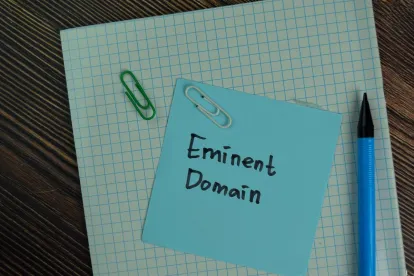On June 7, 2022, House Bill 698 was introduced in the Ohio House of Representatives. The Bill would amend Ohio’s eminent domain law, Ohio Revised Code Chapter 163, in numerous ways that are favorable to property owners and unfavorable for appropriating authorities. Highlights from the Bill include:
Settlement Offers Would Become Binding
-
Currently, an appropriating authority must provide the property owner with a written Notice of Intent to Acquire and a Good Faith Offer to purchase the property rights at issue at least 30 days before filing an eminent domain lawsuit, and the Good Faith Offer must be based on an appraisal. Afterwards, the appropriating authority is free to make whatever settlement proposals it wishes without impacting the ultimate compensation awarded to the property owner.
-
The Bill would change this by making any settlement offer made after the Good Faith Offer the minimum for any future settlement offer or compensation award. Further, the appropriating authority would be prohibited from presenting evidence that compensation should be less than the increased settlement offer (including, presumably, the appraisal on which the Good Faith Offer was based).
-
This change could discourage appropriating authorities from making settlement offers that are higher than the Good Faith Offer, and would likely drive more eminent domain cases toward jury trials.
It Would Become Much More Difficult to Establish a Taking is Necessary
-
Eminent domain can only be exercised when it is necessary for a public use. Currently, an appropriating authority is entitled to a presumption that the taking is necessary when it is approved by the authority’s governing board. The appropriating authority is also entitled to a presumption of necessity when it introduces evidence of necessity at a court hearing.
-
The Bill would eliminate these presumptions.
-
The presumptions shift the burden of proof to establish necessity from the appropriating authority to the property owner, and they are rebuttable, meaning the property owner can overcome the presumption of necessity with evidence that the taking is not necessary. Thus, this change would keep the burden of proof on the appropriating authority to establish the necessity of the taking.
-
The Bill would also change the standard of proof that would apply to the appropriating authority’s showing that a taking is necessary from preponderance of the evidence (meaning more likely than not) to clear and convincing evidence, making it more difficult for an appropriating authority to establish necessity.
-
Current law also provides for a presumption of necessity in favor of a public utility or common carrier where the taking is approved by a regulatory authority. This presumption is irrebuttable, meaning it cannot be overcome by the property owner.
-
The Bill would narrow this presumption by requiring that every interest sought in the applicable easement would have to be specifically approved by the regulatory authority for the presumption to apply.
-
This change would effectively eliminate the irrebuttable presumption because regulatory agencies do not approve individual easement terms, and under current law they likely lack jurisdiction to do so.
Property Owners Would Recover Their Legal Fees More Often
-
Following what is known as the “American Rule,” parties in eminent domain cases are typically required to pay their own legal fees and costs. There are exceptions, including when a property owner obtains a total victory on a necessity challenge, resulting in the dismissal of an eminent domain lawsuit.
-
The Bill would change this in certain circumstances, including by awarding legal expenses to a property owner if the court finds even partly in its favor on the issue of necessity. The Bill would also change existing law by awarding a property owner its legal expenses incurred in defending an appeal by an appropriating authority if the underlying judgment is affirmed in whole or in part.
-
These changes would make it potentially more affordable for property owners to vigorously defend eminent domain lawsuits and would likely increase the amount of litigation and reduce settlements.
Time Limits in Eminent Domain Cases Would be Relaxed
-
Ohio law requires that eminent domain matters be advanced as a matter of immediate public interest and concern and heard by the court at the earliest practicable moment. In that vein, Chapter 163 provides that hearings in eminent domain cases must occur within very short periods of time.
-
The Bill would substantially relax these time periods.
-
This change would work to property owners’ advantage, since it would give them more time to develop favorable evidence on the issues of necessity for the taking and the amount of just compensation.
-
Additionally, this change could delay infrastructure projects where the appropriating authority does not have “quick take” rights. Quick take—where the appropriating authority deposits with the court the appraised value of the property rights being taken, and can then immediately take possession and begin work—is typically only available for roadway projects, so any other projects would be impacted.
It Would be Easier for a Property Owner to Recover for an Uncompensated Taking
-
Under current Ohio law, if private property is taken for a public use without the payment of just compensation, the property owner must seek a writ of mandamus to require the appropriating authority to initiate an eminent domain lawsuit for the purpose of paying compensation. Under that procedure, the property owner has the burden to show that a taking has occurred by clear and convincing evidence.
-
The Bill would change this by providing property owners a direct right of action for inverse condemnation, which would address whether a taking has occurred and the amount of just compensation in the same lawsuit. Further, the property owner would only need to establish a taking occurred by a preponderance of the evidence in order to prevail.
-
Finally, in another departure from the American Rule, the Bill would require the court to award a successful property owner in an inverse condemnation action its reasonable legal expenses.
-
These changes would make it much easier and more affordable for a property owner who has suffered an uncompensated taking to obtain compensation by removing procedural and economic hurdles.
If passed in its current form, the Bill would represent a sea change in eminent domain law in Ohio, giving property owners far greater rights than they currently have, and likely making it much more difficult for private property to be taken for public use.
The primary sponsors of the Bill are Representatives Darrell Kick (R- Loudonville) and Rodney Creech (R-West Alexandria), and the bill does have bipartisan support, with Representative Thomas West (D- Canton) joining nine other Republican cosponsors.
The timing of the Bill’s introduction makes it unlikely that it will be referred to committee until the full House is back in session, which is scheduled to occur in November of this year. Even then, it is unlikely to get a hearing during this (the 134th) General Assembly. It may be that the sponsors introduced the Bill when they did to gauge interest and opposition, in order to work out some issues over the summer, with the goal of reintroducing a modified version of the Bill early in the next General Assembly.





 />i
/>i
